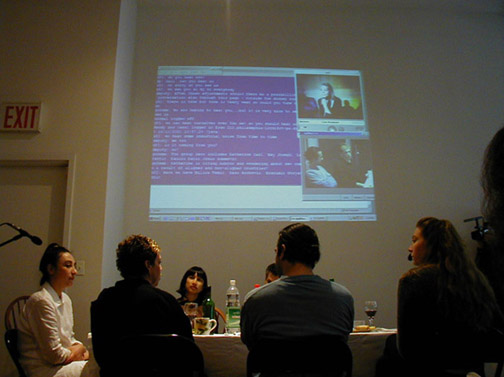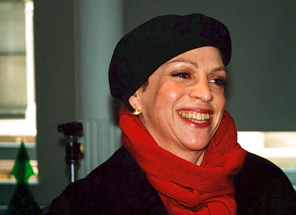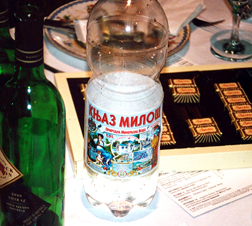|
After
the horrors of World War II, Theodor Adorno wrote that, it
is part of morality not to be at home in one's home. Yet as
a result of this extreme unsettledness some people decide
to stay at home literally to try to rebuild from the inside--even
at the moment when so many others decide to leave their homes.
Under these circumstances, home is most brazenly revealed
as inorganic; it is not a natural community that springs from
the ground or in the blood. As Adorno states elsewhere,whatever
is in the context of bourgeois delusion called nature, is
merely the scar of social mutilation...what passes for nature
in civilization is by its very substance furthest from all
nature, its own self-chosen object.
How have
the concepts of globalization and nationalism or radical fundamentalism--which
all can be viewed as utopian--related to each other in the
last ten years or so, and how has this relationship been playing
out in the past few months? In the midst of the unceasing
search for the selective homeland, or on the other hand, a
holistic global community, where is the home for critical
political formations?
Like the
medium of the web, home in the 20th century became increasingly
multiple. Whether or not home is migratory, it is certainly
constantly evolving through the play of imagination and also
everyday actions, as Benedict Anderson and May Joseph assert
respectively. Further, again like the internet, home is unstable.
It is aoristic, consisting of a multitude of forms without
clear bounds: departures, returns,enjoyment, longing, and
creative innovations.
(Quotes
from Adorno's Minima Moralia,
aphorisms 18 and 59)

The guests in New York:
Jonus Ademovic, architect from Mostar,
Bosnia, living in New York
May Joseph, performance theorist, New
York University
Drazen
Pantic, web media specialist and writer
Irit Rogoff, art historian, Goldsmith's
College, University of London
Sandra Sterle participated online from Zadar,
Croatia
The streamed discussion from Belgrade took
place in Dom Omladine in
collaboration with Center
for Contemporary Art, Belgrade. Thank you to them for
helping us to realize this project.
Milica and Branimir proposed
to participate in the project from their home in Belgrade.
Menu: Prebranac
(Balkan traditional bean dish), various salads, baklava, Bajadera
candy, red wine
Introductions
around the table
Katherine:
First, Drazen, welcome to the table. Drazen has been behind
the scenes for every single streaming providing support and
mking it successful for everyone. So itís nice to have
him here at the table. Thank you Drazen. I just want to mention
that we can see the people in Belgrade on the screen;
Milica is in the middle. To her left is Branimir Stojanovic,
he is a theorist, and over on the right we see Aleksandar
Boskovic, he is an anthropologist, and he is from Belgrade.
He has been living in Johannesburg as a professor for some
time. He is going back and forth between Brazil. He has been
in Slovenia teaching. He teaches in a number of places. And
the translator, who is also in Belgrade is Svebor Midzic;
he will also contribute ideas to the conversation. And it
looks as though weíll be having the conversation through
typed chat since we are unfortunately not receiving any sound
from Belgrade.
Jonus:
I am from south of Bosnia, from Mostar, I am an architect
and artist. I have been living in New York for seven years.
I came as a refugee to America.
Irit:
I currently live in London. I am from Israel originally, educated
in Britain and in Germany, professionally trained in the United
States. I am a theorist of visual culture and most recently
my preoccupations have to do with what I call geographies,
which is the attempt to rewrite relations between subjects
and places, perhaps much in the name of what Katherine has
mentioned.
Danica:
I am a visual artist from Sarajevo, I live in Dusseldorf,
Germany. A lot of my work has to do with some kind of "collective
voice" and global issues. I would like to welcome you
to this go_HOME "last supper" on my behalf as well
as Sandra Sterle's, who will join us through the internet
from Zadar, Croatia.
May: I
originate from Tanzania. I've been doing a lot of work around
migration and citizenship and some of the issues that you
talk about here today are of interest to me, because some
issues have risen recently.
Drazen:
I came from Belgrade, and I have been here for the last three
years. I feel at home here, because it is so similar to Belgrade.
I used to work a little bit with B92, where I used to work
on the internet operation. And I am writing and creating internet
architecture basically around culture and globalization.
Katherine:
Something that I talked about a little bit with Milica was
whether there is a new community being created among these
formerly "non-aligned countries?" Now that the United
States is attempting to build a global alliance, is there
a new alignment in the world and are there critical political
voices taking issue with this global alliance? That is something
Branimir and Milica had been discussing. I would like to invite
people to raise questions and comments.
Jonus:
Katherine, when you said non-aligned, did you mean former
Yugoslavia or other countries of the world?
Katherine:
I meant the countries of the former Yugoslavia plus other
countries like Egypt, who were all in the 1970s considered
"non-aligned" with either of the cold war powers
of the United States or the Soviet Union.
Jonus:
Because we [the countries of the former Yugoslavia] were aligned
before the war.
Drazen:
Yes, we were something like a commonwealth.
Katherine:
Something that is interesting to consider, which Branimir
may bring up later, is his idea that at this time the United
States seems to be acting a lot like Milosevic was in the
1990s, in terms of forming a community that is very closed--now
this is on a global scale.
Jonus:
There is the Alpe-Adria region--Italy, Austria, and Slovenia--which
collaborated for long time even before Slovenia was a part
of the former Yugoslavia. That is very interesting for me
because we always hoped that in the former Yugoslavia once
you erase the borders of the state you would be free to form
your own identity. And then we have this unexpected emerging
of a secondary identity, which is a strange phenomenon for
me.
May: You
call regional identity secondary identity?
Jonus:
I don't know whether it is secondary or primary, but since
we are talking about nationalism, which I consider deals with
the national state in a political sense, it is the primary
identity.
Irit:
Do you think there is a sort of confusion around the three
terms: home, nation, and globalization. Have they begun to
be defined in opposition? In fact, I don't think they work
like that. Because, let's say the way globalization is working
right now is a kind of unholy alliance between someone called
General Musharaff and Robert Mugabe in Zimbabwe and George
Bush in Washington and Ariel Sharon in Israel. What they have
in common is some kind of claim against terrorism. Whereas
in fact they--each and every one--are the regimes of unholy
terror. So I think it is terribly dangerous for us to fall
into the trap of saying that home, nation, and globalization
are antagonistic. They sustain each other all the time. Each
one is a necessary component for the development of the next.
In fact, it would probably be interesting to figure out how
people understand globalization from the personal perspective
of what one is doing, away from all of the large claims of
accessibility, constant circulation, internationalism, and
so on. How do you understand
globalization?

May: It
is a question that is quite hard at this time and point to
answer. Precisely because we have been so used to the language
of mobility, flows, hybridity, and nomadism. I am certainly
speaking from the vantage point of the United States. There
is, to me, an odd return to a moment that I associate with
early nation-state formation. I am thinking of Tanzania in
the '60s. Most of the non-aligned countries were decolonized
in the 20th century. So there was a lot of nation-building
in places like India and Tanzania. It was very much like not
having a home. Home was not an issue because it was never
possible--it wasn't available-- India was a new conception,
it was born in 1947 as a state. So the whole idea of home
was a new idea; and was one that was up for negotiation. How
it came to be was very violent. At that time the whole idea
of globalization was divided into two worlds: the cold war
and the third world system. So there were these two operating
logics that dissolved in 1989. For me, this whole idea of
globalization has three layers.
In fact,
globalization was an old phenomenon by the 10th century. There
have been elaborate migrations of peoples, movements of commodities
and of nomadic tribes for centuries. So globalization already
exists, in fact, in the 10th century, but in the 20th and
the 21th century it is defined in relation to passports and
citizenship.
Irit:
Globalization in the 10th century is a fact, but it is not
acknowledged because it happened in the East. The Western
European perception of knowledge is that it influences everything
else, and it is not influenced by much outside, despite the
fact as youíve said from the 10th century onwards,
people have been moving across continents and oceans. So I
think globalization is not really about what is happening
today. It is more about the willingness to acknowledge that
shifts have occurred in the relations between places and knowledge.
For me it is much more a consciousness shift than an economic
shift or the free-floating circulation of commodities.
May: But
the question that I have is how does citizenship fit in? Because
one of the things that globalization madedifficult was the
legal or illegal state of being. You know, the difficulty
of being in a state where one was not born, and on the other
hand, the right to be in a state by definition because one
is Serbian or Croatian or a particular ethnicity.
Drazen:
The thing with globalization is that telecommunication, the
internet, and satellites have opened this public space providing
fast and free circulation of informatiom.
Irit:
Yes, you have all the apparatus to communicate but the question
is who and what is allowed to circulate freely and who is
kept absolutely bound.
Katherine: I am sorry to interrupt
but Sandra has joined us online from Zadar. And also in Belgrade
they were wondering about your comment, Jonus, about the alliance
of the formerly non-aligned countries being something natural,
being something organic. Could you elaborate a little more
on that?
Jonus: I didn't mean non-aligned
countries. I meant more the alliance of space, for example
as Iíve already mentioned Alpe-Adria.
Katherine: In the chat,
Sandra and Dan mention that,"ìpeople change alliances
very often nowadays, and this is somehow different, but not
very different from politics: it is a question of different
kinds of identities. Mentioning primary or secondary identity,
there are different alliances of belonging, different communities."
But I think they are also pointing out the political situation
at the moment. People are switching alliances for political
reasons. They continue, "Probably our world is becoming
much more fragile." They are asking from
Belgrade, "is there any space between global capital
flow/corporate spaces and Islamic fundamentalism--is there
any space between those two and how does this function?"
Drazen: There is very sharp
line or boundry between those two.
Katherine: Milica Tomic and
Branimir Stojanovic from Belgrade are asking us to listen
to their stream from Dom Omladine. There is no sound coming,
so weíll communicate by typing.
Fritzie: I don't think I can
deal with this.
Katherine: (reading
from the screen "I think we tend to see the current historical
moment as the defining one. I think this is a great oversimplification."
Jonus: Thinking about globalization
in terms of flow of capital and preservation of local economy
is interesting to me. Let me tell you this funny story about
McDonald's in Sarajevo. After the Olympic games, McDonald's
wanted to open a store on Bascarsija (old and famous part
of Sarajevo) and the marketing team reported that they couldn't
compete with Bascarsija traditional restaurants because no
one would eat McDonald's there. Because of the war the opening
of McDonald's was delayed and about four years ago they thought
they would move to another part of the city near the art academy
and theatre district. The marketing department concluded that
there would be no profit at that location either because artists
and students certainly don't eat McDonald's food and hate
the whole idea that it represents. So finally a year ago McDonaldís
opened a store in the suburb of Sarajevo, the so-called new
part of the city "Alipasino polje" where there are
no local traditional stores, and nobody cares. Iíve
recently read in the Village Voice
that the best burger in New York City is in this tiny, tiny
Bosnian place in Queens. There are even no tables, but it
is said to make the best burgers in the city. These two stories
was some strange, perverse dislocation for me. This proves
the notion that McDonald's would have failed on Bascarsija.
|
|
 |
Drazen: During the bombing
of Belgrade, in order to survive the McDonald's there had
the staff wear hats that were just like the "Sajkaca,"
the traditional Serbian soldier cap from World War I that
is some kind of national symbol.
Katherine: I'd be interested
to hear people's comments about the opposite effect of exporting
local culture out into a wider global realm. For example,
looking at local pop cultural forms that are not coming from
Hollywood, but end up being marketed and exported.
Irit: Last year I went to
see the big pop art exhibition in Paris, one of those flamboyant
exhibitions that Centre Pompidou puts on. One of the things
that I realized was that the Indian connection was completely
lost in the history of pop art. There is a way, for example
that Indian culture circulates in the late '60s through music
and through pop art--decorations and clothing--that is absolutely
not acknowledged. One thing that we are exceptionally bad
at is that kind of acknowledgement of cultural circulation.
It was George Harison dying last week that certainly made
me think of these incredible connections. For the whole late
'60s India is everywhere. And that is circulation. I think
the ability to break this kind of self-sufficient model for
the West is important and to recognize that we are shaped
and not just shape.
May: One of the examples of
globalization that I give to my students is to take them to
the world music section of Tower Records. I do that because
I work in the field of performance and the cultural circulation
of performance. It has always struck me that postmodernism,
and before this the avant-garde, was always available as part
of the identity of the West (I see this very broadly as Europe
and the United States). But the western view of the identity
of Japan or Taiwan or India is always one exclusively of traditional
forms and high culture, not pop culture. I was part of the
avant-garde movements back in India, which experimented with
ideas that have come out as international influences. We incorporated
Indian influences as well and in theatre. But that was not
the sort of theatre that would gain visibility, that would
circulate, to come to New York. For instance, when Brooklyn
Academy of Music is looking for a representation of African
performance--in other words South Africa--they'll get a national
theatre group and to represent India they bring the National
Theatre. When it comes to interesting performance coming from
Europe one looks for the extreme avant-garde. So it is always
interesting for me that in globalization you reach a kind
of a limit point. There is very interesting East African form
of music, that was Arabic plus incorporating Cuban forms,
but these are the forms that don't circulate because they
don't fit into the US notion of what is African music. I guess,
what I am saying is that globalization produces a kind of
localness. For instance, American jazz musicians, working
in experimental forms, can go to India or Africa and pick
an artist to do fusion with, but if an artist from Africa
or India wants to apply for something in the United States,
they have to prove they work in a pure form, A traditional
form that fits into the recognizable category.
Irit: These recognizable categories
and the cultures that produce them are considered sacred by
the West. They are what Levi-Strauss called "sacred zones."
You keep certain places in the world as sacred zones--it is
an manipulative exercise of Western power.
Katherine: Milica and the
people in Belgrade are were wondering if we have questions
for her. Could we pose questions about her work or about the
thinking that is currently going on in Belgrade?
Irit: One of the things that comes to my mind
when I think about Milica's work is that she creates an intertextuality
of trauma. Her work, "I am Milica Tomic" accomplishes this.
Her creation of trauma is linked to the structure of trauma
and not to the detail or local specific experience of trauma.
We actually have to find the language in which each of those
traumas can speak to one another, in a sort of intertextuality.
I'd like to know Milica, what do you think? And also I am
really sorry, that I can't hear
you.
Katherine: There is some chat dialogue
in Serbo-Croatian between Sandra and B92, which is great.
The people in Belgrade are very concerned, they are feeling
cut off. They can see
us but they can't hear us. They are asking if we can see
them.
Jonus: It is strange with
this delay...
May: This delay actually describes
one of the dilemmas in globalization discourse as well. In
the third world we always have tradition, but we don't have
modernity because our modernity is always viewed as a repetition
of what has already happened in the West. That is the delay.
Modernity experienced in the so-called third world is always
an echo of Western modernity and not something else that is
new. The whole question of other kinds of modernity really
did come up in very difficult ways with the current situation.
The United States has always considered Muslims part of their
community, but Islam was somehow outside the United States.
We have a large Muslim community in the United States and
now with this whole event we have very comlicated questions
about who is a citizen, even if you have had citizenship for
four generations, like Palestinian-Americans.
Irit: I think that the United
States has very serious Christian fundamentalism and that
is not perceived in the same way as Islamic fundamentalism,
because the underlying concern is not about fundamentalism
but about Islam, and it is about geopolitical interest. For
example the conversation or conjuctions between something
called Christian fundamentalism and something called Islamic
fundamentalism is not brought up; that is not recognized at
all; that is out of question.
May: Thank you for talking
about Christian fundamentalism. It is a very difficult time
to talk about this...it is a very depressing time.
Katherine: I am so sorry,
but I really do need to interrupt because in Belgrade they
are having a parallel
conversation going on at the moment, and they are talking
about copyrights. Aleksandar is an anarchist, and he is very
concerned about copyrights and ownership in relation to nationalism
and globalization. The question is about what nationalism
is and how it is related to ownership. Then Branimir says,"the
nation is a19th-century problem, not a modern problem. the
nation died in concentration camps during the Word War II."
Jonus: He is talking about
delay, we formed in our world some kind of delayed process
of forming nation states...
Katherine: He may also be
saying something about the notion of home, or home as nation,
being suspect.
Irit: That goes back to the
way in which politics and positions are always written under
the sign of the nation-states, not under the fact of internal
conflict with the nation state. Globalization becomes a lot
of nation states. And that is why I am sort of suspicious
of the notion of home, because home is some kind of attempt
at refuge from the nation-state. There is no refuge. It is
absolutely pointless. My worry about home is that it always
becomes a place where you can drop out. I think it is sentimental
because of this notion of dropping out.
May: There is actually no
core to what we call home; it is like an onion. There are
different layers that we experience, which create forms of
belonging, and they shift, and traumatise, and they mutate.
This all makes up home, but there is no singular essence of
home. For example my accent changes according to where I am.
When I am in India, my accent is more Indian, when I am in
Africa, my accent is more African, English, etc.
Jonus: I think that home is
a point from which circles of family, friends, neigbourhood,
city, state, and world emerge. During the war in my hometown,
Mostar, the first two circles of family and neigborhood broke
down. When this happened it was much worse than anybody could
ever imagine. When I read the letter
from Milica and Branimir, who described themselves as immigrants
within their own city and country, I was thinking about this
condition and their experience. Maybe they feel that their
primary circle, their family, friends, neighbors, or their
home is intact, but there is this vacuum between state and
the world. The world abandoned them just as their state abandoned
them.
Katherine: The participants in Belgrade are
asking you if you have a home, Jonus.
Jonus: I have a home as long as my parents
are alive.
Danica:
Nationalism and Globalization or Pleasure of Drinking Water
Special
thanks to Jonus Ademovic for bringing 3 bottles of mineral
water, from 3 different sources (Sarajevska Mineralna Voda
from Bosnia, Knjaz Milos from Serbia, and Radenska from Slovenia),
bought in Astoria, Queens, New York.

|
